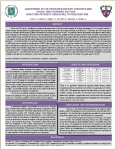Assessment Of The Perceived Patient-centered And Social And Economic Factors Affecting Patients’ Adherence To Prescription
Abstract Category: Science
Course / Degree: Pharmacy
Institution / University: University of Santo Tomas, Philippines
Published in: 2014
Since the 20th century, therapeutic compliance has been a topic of clinical concern because of the large percentage of non-compliant patient in medical therapy. Non-adherence is a great problem facing the health care system and it places a threat on the economy. The primary aim of this study was to assess the perceived factors affecting patient’s adherence to the prescription given to them. The perceived factors emphasized were patient’s health literacy, their knowledge on their medication, and the cost of their therapy and income. Fifty outpatients of the University of Santo Tomas Hospital were selected as the respondents through convenience sampling. The perceived factors were assessed by a questionnaire and adherence was assessed by self-assessment by the patients. Chi-Square Test was used to determine whether there is a significant difference between the perceived factors and the adherence to prescription. It showed that there is no significant relationship between health literacy and the patient’s adherence to prescription, since their chi-square value of 4.882 is less than the critical chi-square value of 23.685. It also showed that there is no significant relationship between patient knowledge and the patient’s adherence to prescription, since their chi-square value of 9.355 is less than the critical chi-square value of 12.592. It revealed that there is a significant relationship between forgetfulness and the patient’s adherence to prescription, since their chi-square value of 28.288 is greater than the critical chi-square value of 5.991. It indicates that there is no significant relationship between time commitment and the patient’s adherence to prescription, since their chi-square value of 1.786 is less than the critical chi-square value of 5.991. It showed that there is a significant relationship between the patient’s income and the patient’s adherence to prescription, since their chi-square value of 12.602 is greater than the critical chi-square value of 5.991.
Thesis Keywords/Search Tags:
adherence, assessment, compliance, outpatient, prescription
This Thesis Abstract may be cited as follows:
Alava, P. J., Alcausin, D. A, Bagon, N. E., Barretto, D., & Bautista, C. 2014. Assessment of the perceived patient-centered and social and economic factors affecting patients’ adherence to prescription.
Submission Details: Thesis Abstract submitted by Danielle Barretto from Philippines on 18-Mar-2014 07:50.
Abstract has been viewed 2760 times (since 7 Mar 2010).
Disclaimer
Great care has been taken to ensure that this information is correct, however ThesisAbstracts.com cannot accept responsibility for the contents of this Thesis abstract titled "Assessment Of The Perceived Patient-centered And Social And Economic Factors Affecting Patients’ Adherence To Prescription". This abstract has been submitted by Danielle Barretto on 18-Mar-2014 07:50. You may report a problem using the contact form.
© Copyright 2003 - 2025 of ThesisAbstracts.com and respective owners.
